Wyrd, Post-Selection, and the Quantum Trickster
Saturday, 7 May, 2016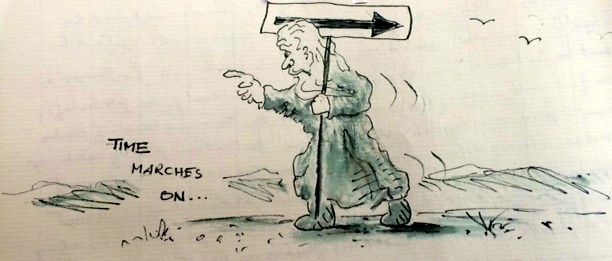
English is blessed with a large and fascinating family of w-r words connoting twisting, turning, and turning-into (in the sense of becoming)—think writhing wriggling worms and the wrath of wraiths. (See my ancient post about “werewords” if you are curious.) My favorite of this family is Wyrd, which comes from the Old English weorthan, “to become,” but with a sense of turning or spinning—as in, the “spinning” of the thread of our life. Wyrd (or in Norse, Urthr) was one of the three sister-goddesses, the Norns or Fates, who together wove a man’s destiny and could thus foretell it. Wyrd, as becoming and as turning, represents “what has turned out” or “what will have turned out” or “what you will have turned into.” It is a kind of future-perfect tense, a retrospective view from a future vantage point that can look back and survey the ironic (or even warped) paths a life has taken.
Paranormal phenomena survive in a post-selected universe precisely by introducing doubt, and mucking with our ability to settle on the right explanation.
Other than through a common appearance in fantasy novels, including the Discworld series of Terry Pratchett, Wyrd survives now in English solely via the wonderful word weird, and this is thanks entirely to Shakespeare’s Macbeth. The “weird sisters” were three prophetic witches living alone in the wilderness, inspired undoubtedly by the Norns, but their role in Shakespeare’s tragedy is far more interesting. Weird didn’t simply mean “strange” as it does nowadays; it meant more a force of compulsion related to prophecy—forcing things to happen because a prophetic person said it. Frank Herbert keyed in on this ancient usage in Dune, where “weirding words” had a compelling force over the hearer.
The concept of Wyrd can thus help us understand post-selection, the quantum physics concept that allows time travel—including time-traveling information (prescience and prophecy)—to exist without producing causality-offending paradoxes. The term comes from quantum computing, where it is simply a filter on the outcomes of a computation: Set a computer to perform calculations and exclude all the various solutions that do not arrive at a desired, “selected” answer. This leaves a range of allowable paths to get to that answer—a certain limited range or degrees of freedom within which information accessed in the past, at time point A, accurately pertains to the future event at time point B. In a way it is analogous to quantum “tunneling”—a particle’s ability to simultaneously take multiple paths to a destination in space—but applied to the time dimension instead.
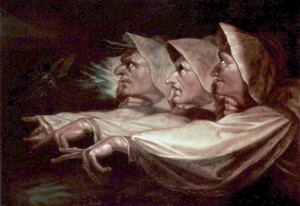 Applied to the larger universe of causality, which is information by another name, post-selection just means we live in a possible universe, and outcomes are those that have “survived” (think Darwin). Specifically, they have survived any possible precognitive detection by an agent capable or desirous of preventing them, or else have been actually facilitated by prophecy (those feedback loops I’m fond of). Under post-selection, a degree of foresight is purchased at the expense of some degrees of freedom of action and interpretation.
Applied to the larger universe of causality, which is information by another name, post-selection just means we live in a possible universe, and outcomes are those that have “survived” (think Darwin). Specifically, they have survived any possible precognitive detection by an agent capable or desirous of preventing them, or else have been actually facilitated by prophecy (those feedback loops I’m fond of). Under post-selection, a degree of foresight is purchased at the expense of some degrees of freedom of action and interpretation.This produces ironic effects that go a long way toward explaining various characteristics of psi and with the paranormal more generally. Post-selection is the Trickster, who might also be called the Timeline Guardian. The witches’ prophecies about Macbeth actually shape his destiny, his Wyrd, embodying the ambiguities and peculiarities of prescience in a possible universe, a universe that must sometimes take strange steps to protect itself from paradox. This may even offer a new way of thinking about psychokinetic (PK, or mind-over-matter) effects that seem to occur in the vicinity of precognition.
Misdiagnosed Informational Reflux
Folklore and tragedies from Oedipus to Macbeth to Dune Messiah show us that prophecy seldom directly and obviously helps further a person’s conscious intentions or plans; often it has the opposite effect. For instance, Macbeth neurotically finds himself striving to achieve his succession to the throne even though it has been prophesied; yet the witches’ more oblique prophecies about his downfall are fulfilled precisely because he misunderstands them until too late; had they been clearer, he would have taken action to prevent them.
Societal disbelief in psi and prophecy must be included in our account of the universe’s immune system against paradox.
Debates over prescience and its paradoxes often misleadingly turn on ideal-typical examples like receiving a premonition of a terrorist attack, which raises the obvious question of possibly using the foreknowledge to warn somebody (and thus foreclose the event). It doesn’t quite work that way in the real world, where prescience has a much more ambiguous character. Because we possess consciousness and free-will, the rule of post-selection guarantees that the vast majority of our precognitive experiences are consciously unregistered as such until after the fact, either because we totally overlook them or, if we detect something premonitory going on, it is subject to too many rival interpretations that it does not occur to us to act (deliberately or inadvertently) in a way that would prevent the foreseen outcome from occurring. Or, we can try to act on it, but the circumstances guarantee that nobody will listen or heed what we say. Nobody pays much attention to credulous paranoids and New Agers who believe in bullshit like ESP; societal disbelief in psi and prophecy must be included in our account of the universe’s immune system against paradox.
None of the nation of dreamers who dreamed of 9/11, for instance, knew exactly what was going to happen or when; even if some did, there was no possibility of preventing the attacks based on such dreams and visions (especially taken in isolation). Precognition is always slippery, always evades our attempt to interpret. It often has an ominous or uncanny flavor, for instance, yet turns out to have a totally mundane meaning once confirmed by events—or else, it seems mundane and innocuous at first glance and then turns out later to have had monumental importance. This is all, I believe, directly symptomatic of how prescience has to work in a post-selected universe.
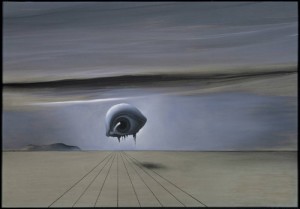 Post-selection is sometimes described as a rule that prevents the grandfather paradox, but the way it works in practical terms is as a context that preserves a tolerable degree of uncertainty about information back-flowing from the future. One of the vexations of psi is that it has always been seen to be a weak signal on a noisy channel; protocols to enhance the signal, such as the redundancy method described in Damien Broderick’s recent book Knowing the Unknowable, cannot get rid of the noise altogether. What this means is that you can never prove that a single psi behavior (guess, dream, insight, drawing, etc.) is authentically an example of psi. You are stuck in a land of statistics and uncertain probabilities and inability to ever make definitive claims.
Post-selection is sometimes described as a rule that prevents the grandfather paradox, but the way it works in practical terms is as a context that preserves a tolerable degree of uncertainty about information back-flowing from the future. One of the vexations of psi is that it has always been seen to be a weak signal on a noisy channel; protocols to enhance the signal, such as the redundancy method described in Damien Broderick’s recent book Knowing the Unknowable, cannot get rid of the noise altogether. What this means is that you can never prove that a single psi behavior (guess, dream, insight, drawing, etc.) is authentically an example of psi. You are stuck in a land of statistics and uncertain probabilities and inability to ever make definitive claims.People always raise the paradoxical idea of having a premonitory dream of dying in a plane crash and then avoiding the flight. What, in that case, “sent” the premonition? But there’s no mystery: The premonition may really be “of” surviving a plane crash that was depicted in the dream as including you. Or if I am right, it would be more accurately characterized as being an oblique representation of your complex emotions sparked (in the future) by surviving a real or possible plane crash. We should not look for literalness in premonitory phenomena, or a direct connection to actual events; they refer to our (future) inner life. And more to the point, you can never be 100 percent sure it was “a premonition” or “a precognitive dream” in the first place and not chance coincidence, just a random dream, and your interpretation of it a hindsight-biased construct.
Don’t Think of a Polar Bear
And really, precognitive dreams and visions are not really “of” the future in any sense: They arrange material already in memory as a best-guess interpretation of unprovenanced “perturbing” information supplied by the precognitive circuit. My work with precognitive dreamwork and hypnagogia over the past two years has made this logic quite clear to me: We’re precognitively dreaming all night and metabolizing our immediate future in hypnagogia all day; but even scrutinizing these phenomena, armed with a notebook and melatonin and Freud’s Interpretation of Dreams, their meaning only ever becomes apparent in hindsight or, often, precisely as the precognized event is already unfolding (thereby adding to the excitement and thus emotional salience of the realization). They largely concern very trivial events, forcing me to conclude that the traditional association of premonitions with disasters and traumas is purely an effect of hindsight bias; prescience is a constant background function (i.e., James Carpenter’s “first sight”), not a rare thing provoked by “disturbances in the force.”*
The Trickster function causes us to find perverse reward precisely in signs of things we don’t want to happen.
Other than dreams, prescience informs our intuitions, parapraxes like misreadings and slips of the tongue or pen, “earworms,” and other manifestations of what Freud called the psychopathology of everyday life. The associative murkiness surrounding psi not only demands that we study these phenomena within a Freudian psychoanalytic framework, as Jule Eisenbud did in the 1970s, but also links them to phenomena described in more recent cognitive psychology, such as the “ironic process theory” of Daniel Wegner. Wegner realized that, if asked, you can’t not think of a polar bear, because a vigilant part of the brain is on the lookout precisely for the undesired thought in order to prevent it. It’s essentially a Trickster function, and such a function would have arisen to orient us toward real threats (not just imaginary polar bears); it causes us to find perverse reward precisely in signs of things we don’t want to happen; the function especially keys in on signals of chaos, entropy, and death or decay.
 Edwin May thinks entropy gradients actually carry the psi signal, but I think it is simply that our psi eyes are drawn to the signs of disorder and decay that hint at something our survival-minded limbic system ought to be aware of. Psi is semiotic, focused on signs, because information is; as psi-dreaming pioneer J.W. Dunne brilliantly discerned, it’s an orientation to information coming down the pike from the brain’s future, not an orientation to objective events out in the world. Wegner’s ironic process, or the Trickster function, explains the perverse linkage of reward to threat (a binding I have elsewhere called jouissance)—explaining why it is really reward and not trauma that “powers” psi phenomena, and why (again, just as Carpenter described with his “first sight” theory), it most often operates awry of our conscious intentions.
Edwin May thinks entropy gradients actually carry the psi signal, but I think it is simply that our psi eyes are drawn to the signs of disorder and decay that hint at something our survival-minded limbic system ought to be aware of. Psi is semiotic, focused on signs, because information is; as psi-dreaming pioneer J.W. Dunne brilliantly discerned, it’s an orientation to information coming down the pike from the brain’s future, not an orientation to objective events out in the world. Wegner’s ironic process, or the Trickster function, explains the perverse linkage of reward to threat (a binding I have elsewhere called jouissance)—explaining why it is really reward and not trauma that “powers” psi phenomena, and why (again, just as Carpenter described with his “first sight” theory), it most often operates awry of our conscious intentions.This may seem to make precognition “useless” but it does not; it only makes it non-straightforward with respect to our conscious aims. It was a big “duh” moment for me about a year ago when I realized that this is just another way of phrasing what ritual and chaos magicians have been saying for many years, albeit in another idiom. Hence the importance (as Gordon White reminds us in his excellent recent book The Chaos Protocols) of “obliquity,” as well as the necessity of a ritualized social context in which to productively exercise psi abilities.
Blinding
The associative remote viewing setups devised by Russell Targ and others are perfect examples of psi-facilitative social ritual—where effectively the psychic him-/herself is “blinded” to the useful meaning of the information they produce until after the fact. Just as the first cells may have capitalized on quantum pre-sense by engulfing tubulin endosymbiotes (more on this in the next post), the only useful psi in the human world is “symbiotic” in the form of teamwork, a relation between, minimally, a “blind” psychic subject and an agent who is alone privy to the specific problem or question being posed—and better yet, even more intermediate layers of knowing/non-knowing.
Wouldn’t it shock most scientists to know that the ancestor of basic experimental controls is nothing other than mediumship.
We should not miss here the resonance to classical archetypes of prophecy. Prophets often are blind, or are blinded. Think blind Tiresias, who is really a mirror held up to Oedipus, who blinds himself upon learning the truth of how his actions fulfilled the prophecies. It is precisely the fact that prescience is always about the psychic subject’s own future enjoyment that makes the subject precisely useless or unreliable as an interpreter of his/her visions; there must be controls in place to take this unconscious foresight and forefeeling, de-bias it, and make it something actionable and useful for the welfare of the community. This is precisely why I think science is a necessary partner in psi: Actually utilizing psi effects requires the same sort of rigorousness and fussiness (blinding and controls) that enables us to capitalize on other elusive, small effects in nature and turn them into something powerful.
We also should not miss the historically well-known role of collaboration in divination and magic: The diviner often requires a more naive assistant as a conduit or reader, which performs the same function as blinding in an experimental context—creating filters to control for bias and to extract prophetic knowledge from the noise that surrounds it. Think the oddball practices like Cagliostro’s use of a child-clairvoyant, or John Dee’s use of Edward Kelly (although you could ask, who was using who, in that case). Experimenter effects are the death of divination. Blinding is really a kind of distillation or extraction operation … And wouldn’t it shock most scientists to know that the ancestor of basic experimental controls is nothing other than mediumship.
In no case can the “psychic subject” gain conscious knowledge, with any certainty, of an event such that the knowledge could be actually used by him-/herself in such a way as to prevent that outcome—kind of like the witches’ prophecy that no one born of woman will kill Macbeth, or that he’ll only be overthrown when Birnam Wood comes to Dunsinane. I’ve noticed that precognitive dreams have a cunning range of interpretations: Until the future referent becomes clear, you can often write them off as having vague links to past events or preoccupations. They have a way of discouraging scrutiny.
Precognition could only have arisen in this “cloaked” fashion; it can only be an unconscious phenomenon. Psi and meaning do not mix, as remote-viewers have always known: There is some contradiction between psi-gained information and understanding its meaning or being able to put its meaning (accurately) into words. It also comes hand in hand with a shaping of our possible degrees of freedom, and cannot be disassociated from our neuroses and deepest motivations.
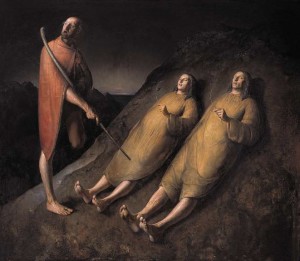 This is similarly clear on the other end of the spectrum from blinding us about fates we might rather avoid: There is also the situation of precognizing an outcome or event in such a way as to impel us to fulfill that outcome. Post-selection also explains why there can be a kind of bootstrapping in which the future seems to cause the past that causes the future, in a senseless loop—kind of like Macbeth’s desperate efforts to fulfill the witches’ prophecy of becoming king. As Macbeth shows, Wyrd entails a kind of neurotic, mechanistic or automatistic responsiveness, or pre-sponsiveness, in the face of prophecy. Generally, we would misinterpret our unconscious foresight as simply inspiration: having a thought to do or seek a thing and then being rewarded by going and achieving it. In these cases—indeed in many cases of artistic and other kinds of creativity—I suspect that “inspiration” is our classical-causal camouflage for prescience in action (what I have elsewhere called “prophetic jouissance”).
This is similarly clear on the other end of the spectrum from blinding us about fates we might rather avoid: There is also the situation of precognizing an outcome or event in such a way as to impel us to fulfill that outcome. Post-selection also explains why there can be a kind of bootstrapping in which the future seems to cause the past that causes the future, in a senseless loop—kind of like Macbeth’s desperate efforts to fulfill the witches’ prophecy of becoming king. As Macbeth shows, Wyrd entails a kind of neurotic, mechanistic or automatistic responsiveness, or pre-sponsiveness, in the face of prophecy. Generally, we would misinterpret our unconscious foresight as simply inspiration: having a thought to do or seek a thing and then being rewarded by going and achieving it. In these cases—indeed in many cases of artistic and other kinds of creativity—I suspect that “inspiration” is our classical-causal camouflage for prescience in action (what I have elsewhere called “prophetic jouissance”).Such situations (which I described as “atemporal feedback loops” in my series on rethinking synchronicities) sound paradoxical, kind of like the grandfather effect, but actually an effect that ensures (rather than prevents) its cause is the opposite of a paradox, even if it challenges our “one thing after another” model of how things happen in a billiard-ball universe. This kind of tautological relationship between the effect and its cause would actually be an expected sort of formation in a universe containing precognitive agents. It may be precisely how complex systems like life arose, as I’ll argue in the next post.
The Hysterical Universe
Here’s where it gets really exciting: Post-selection might also help us understand PK and other tricksterish mind-over-matter phenomena that closely attend prophecy.
The tendency for weird physical manifestations to surround powerfully precognitive individuals suggests that the universe may be straining, hysterically, to protect the timeline.
In my earlier post on sleep paralysis and OOBEs, I raised the question of precognition’s possible relationship to apports and other PK phenomena, such as my “astral foot” possibly knocking over a rock in my study during an OOBE … or not. My limited experience has inclined me to think that what seems like astral journeying is really very vivid precognition of a future real-life experience in the target locale … thus my astral foot was safely in my bed at the time the rock fell, and my electrified bodymind was precognizing a scene in my study precisely a year in my future—nowhere near the rock in either time or space.
The intuitive notion that the mind in an emotional state can “reach out” and muck with matter via some energy or disturbance in the “consciousness field” is, I think, an appealing, easily visualized idea but hard to square with physics as we understand it. However. according to some interpretations of post-selection, time travel—including time-traveling information—would sometimes produce anomalies, highly improbable events, precisely to protect the timeline from paradox. If you went back in time to shoot your grandfather, you would be thwarted somehow, even if it took a UFO to appear from nowhere, or bigfoot to leap out of the bushes and kill you, or (more plausibly) a manufacturer error at the bullet factory. The way precognitive information is held in our associative ‘premory’ protects the timeline, as I’ve shown, but inexplicable phenomena in our physical environment might also.
in other words, what if a powerful precognitive experience like one of those “Howitzer” long-range OOBE precognitions of an event a year in the future—an event that, because of its distance, would be particularly vulnerable to perturbation in a butterfly-effect universe—could actually “force reality’s hand” to produce an improbable or even outrageous physical effect that raises doubt about the precognitive nature of the experience and thus protects the timeline from interference?
PK, like other psi phenomena, tends to disobey our conscious intentions or yield very micro-sized effects. Its most dazzling manifestations seem to be oblique, like the bent spoons and stopped clocks (and weirder events like teleportation) that surround Uri Geller but which he cannot quite control. The tendency for weird physical manifestations like apports and poltergeists and “exteriorizations” to surround powerfully precognitive individuals—Whitley Strieber would be another example—suggests that the possible (post-selected) universe may be straining, hysterically (i.e., “acting out”), to protect the timeline. (Coincidentally or not, hysteria characterizes the personality of many of those highly psychic individuals too.)
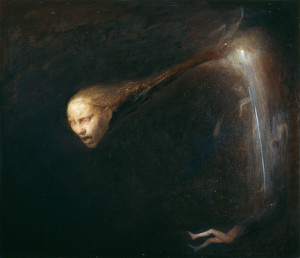 The displacement of my specularite from its perch, for example, precisely supported the standard OOBE interpretation of the experience, distracting me from any suspicion that it had a precognitive dimension. Had I suspected precognition, I might have done more to try and confirm its target and thus potentially altered my destiny. PK may be the probabilistic recoil of psi’s big guns, in other words. No “subtle bodies” are needed, just a “queering” of ostensible randomness toward the nonrandom. I find such a hysterical-causal pathology around prescience more believable than invisible pseudopods reaching out from our bodies to bang on stuff and knock things off the shelves … but that’s just me.
The displacement of my specularite from its perch, for example, precisely supported the standard OOBE interpretation of the experience, distracting me from any suspicion that it had a precognitive dimension. Had I suspected precognition, I might have done more to try and confirm its target and thus potentially altered my destiny. PK may be the probabilistic recoil of psi’s big guns, in other words. No “subtle bodies” are needed, just a “queering” of ostensible randomness toward the nonrandom. I find such a hysterical-causal pathology around prescience more believable than invisible pseudopods reaching out from our bodies to bang on stuff and knock things off the shelves … but that’s just me.This is why I tend not to think of the “supernormal” as some realm of latent powers that humans are destined to develop more fully as the “next phase in our evolution” (a la Frederic Myers). For precognition to exist, it has to be mostly hidden, protected by dense layers of psychological and social resistance that would compel us to see its effects as anything but seeing or knowing the future. Future psi wizards are not going to be X-Men or Jedi Knights waving their hands to levitate stuff; they’re going to be, basically, furtive psychomagicians and chaos magicians engaged in weird rituals to program their own unconscious in private and idiosyncratic, highly weird, ways.
A Causal Immune System
The social unacceptability of psi and the paranormal to button-down minds is not only that it involves liminal (category-defying) subjects, as George Hansen argues in his monumental study The Trickster and the Paranormal. I think it goes even deeper: It is that the real process and mechanism that (I argue) must underly some or maybe even all of these phenomena—precognition—trespasses on our most basic understanding of causality and seems to invite paradox, which is the most loathsome thing to a rational person. It is why prescience, of all psychic phenomena, is especially taboo: It is essentially a temporal analogue of incest. Oedipus, as I’ve argued elsewhere, was an ancient gedankenexperiment about prophecy and causality, linking foresight both to the (grand)father paradox and to forbidden enjoyment.
Since the beginning, humans have talked about gods and spirits and spirit worlds and telepathy, without understanding that we are really talking about the tunneling into our own future timelines enabled by the quantum brain.
Paranormal phenomena survive in a post-selected universe precisely by introducing doubt, and mucking with our ability to settle on the right explanation. It’s possibly even their function: Some PK effects could be “high improbabilities” generated by the activity of our precognitive faculty. This may be part of precognition’s camouflage, an essential aspect of the way precognition survives as an adaptive trait in sentient, willful organisms like ourselves. When we know too much, we’re f***ed. Which also explains the link between the paranormal and paranoia: We instinctively know that this zone of taboo-defying phenomena is dangerous, and the universe’s immune system might not like us peering too closely. (It would be not too unlike the Strugatsky brothers’ wonderful novel Definitely Maybe, about a cosmic immune system against advanced science, and perhaps also not too unlike Jacques Vallee’s control system hypothesis.)
 Every culture, at all times, has misunderstood the power of prescience. Even when they acknowledge that it sometimes occurs (as nearly all besides ours do), it is this repulsive paradoxicality that deters people from pondering the mechanisms, the “how.” It is precisely the line of inquiry blocked by that Timeline Guardian, the Trickster, who sends us off in every other possible direction than the future. Since the beginning, humans have talked about gods and spirits and spirit worlds and telepathy, without understanding that we are really talking about the tunneling into our own future timelines enabled by the quantum brain. The Greeks of Sophocles’ time, for instance, thought that prophecy had to be supplied by the gods, not directly perceived by the seer.
Every culture, at all times, has misunderstood the power of prescience. Even when they acknowledge that it sometimes occurs (as nearly all besides ours do), it is this repulsive paradoxicality that deters people from pondering the mechanisms, the “how.” It is precisely the line of inquiry blocked by that Timeline Guardian, the Trickster, who sends us off in every other possible direction than the future. Since the beginning, humans have talked about gods and spirits and spirit worlds and telepathy, without understanding that we are really talking about the tunneling into our own future timelines enabled by the quantum brain. The Greeks of Sophocles’ time, for instance, thought that prophecy had to be supplied by the gods, not directly perceived by the seer.A few ancient philosophies do veer excitingly close to a god-free vision of Wyrd, our ironic and mysterious relation to the future. The Yogacara science of mind, with its “substrate consciousness” where the seeds of Karma are planted comes very close. My friend Alex van Oss (who did the illustration at the top of this post) alerts me that in the Caucasus the concept of Kebzeh (“the law of cause-effect and effect-cause”) is very similar; one of its principles, “produce the effect and the cause will follow” could really be another way of phrasing post-selection. In Europe, Hegel articulated a similar idea, with his retrospective understanding of history; and Freud came daringly close when he mapped the unconscious and philosophers like Sartre rightly asked “where is this unthought thought occurring?” As I argued, the question should really be “when?”
NOTE:
* Here’s a particularly good example of the mismatch between triviality and significance that contributes to our nonrecognition of the precognitive nature of dreaming. One morning a couple years ago I wrote down all I could remember of a dream that felt like some Central European (Czech or Polish) New Wave film from the 1960s, black and white, about a couple on vacation, a car at an intersection, and something about a sailboat on a lake—almost more of a vague impression than anything narrative I could pin down. A moment’s reflection on waking told me it was actually a specific movie I had dreamed of: Knife in the Water by Roman Polanski. It had been many years since I’d seen it, and I really just had a vague impression limited to the images and ambience of my dream. (I’d always vaguely confused Polanski’s film with Plein Soleil, the 1960s adaptation of Patricia Highsmith’s novel The Talented Mr. Ripley.)
Okay, I went to work and sometime mid-morning, probably about 10:30, I went into the small kitchen to get the serrated knife (it’s a sparsely appointed office kitchen, and there’s just one such knife) to cut and peel my apple. What should I encounter but the sink backed up, and a single object gleaming at me at under about four inches of gray dirty water: the serrated knife I wanted. Often the referent of dreams isn’t obvious at first, but this one struck me immediately on seeing the “knife in the water” like that: Information about this minor annoyance/upheaval in my morning had entered my unconscious “premory” and triggered an association to that Polanski movie; thus my brain concocted a little image to pre-present this event (or more accurately, the gestalt of my event and my very slightly depressed reaction to it) about 3 or 4 hours in advance.
A dream feels like a big immersive experience. Naively, it seems odd that the brain would “go to all the trouble” of representing something as trivial as a knife in a clogged sink using something as “big” as, in this case, a movie scenario about a couple’s eventful holiday on the water—as if such an image is, itself, kind of a “production” requiring actors, a set, and props, etc. But a moment’s thought shows how silly that is: For the brain there was no effort whatsoever in triggering a few neurons associated with that old Polanski film. This same apparent mismatch of scale and significance has been the mental block for many people, including Frances Yates, in imagining the usefulness of the art of memory too. A mnemonic image seems somehow effortful, like a big elaborate stage play, so how could it be an efficient method of learning? In fact it’s just the activation (via free association) of a tiny handful of items already in your head. Once you start doing it, you realize how effortless it is.
Given the immersiveness of dream experiences, we also naively assume that they unfold in something like real time. In fact, the few images in my dream could have been a brief flicker of cortical activity lasting a few seconds or even just a few milliseconds. When we realize we spend a couple hours each night dreaming, and any given dream we actually remember may represent just a tiny, tiny fraction of that cortical activation, then it becomes easy to imagine how we could be metabolizing all of our daily experience—both of prior days and subsequent days—in the course of a night. Dreams are easy for the brain, not a “production” in any sense of the word.
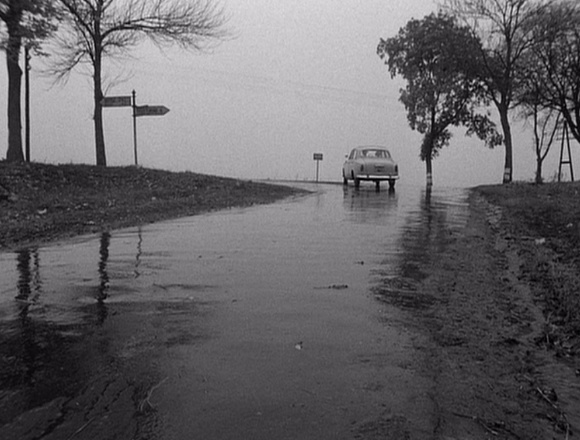
Thanks to Eric at: http://thenightshirt.com






 Sat Mar 23, 2024 11:33 pm by globalturbo
Sat Mar 23, 2024 11:33 pm by globalturbo

